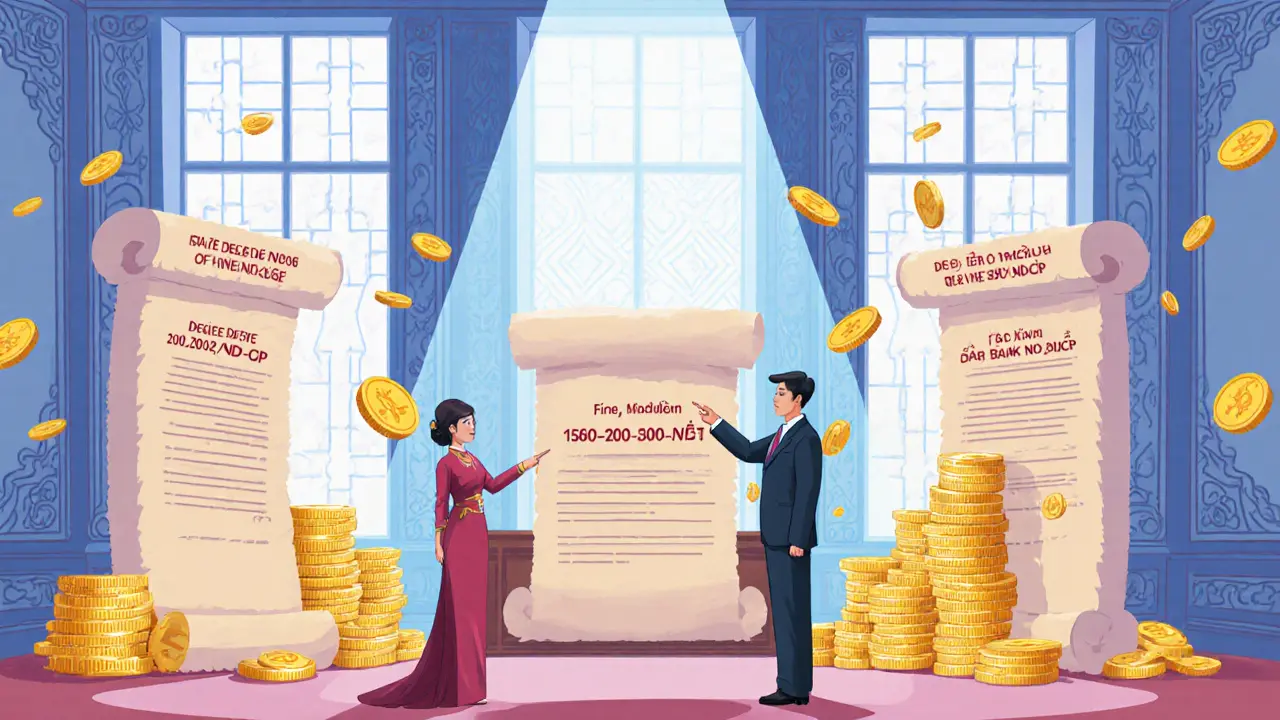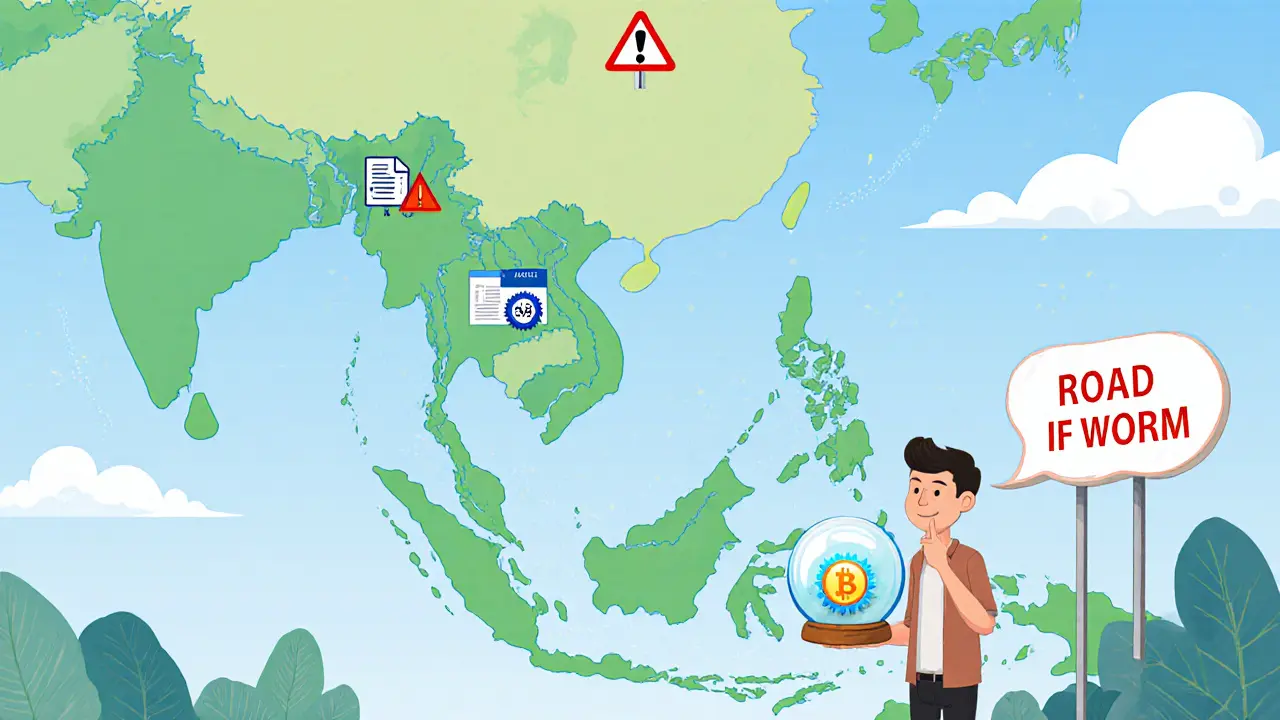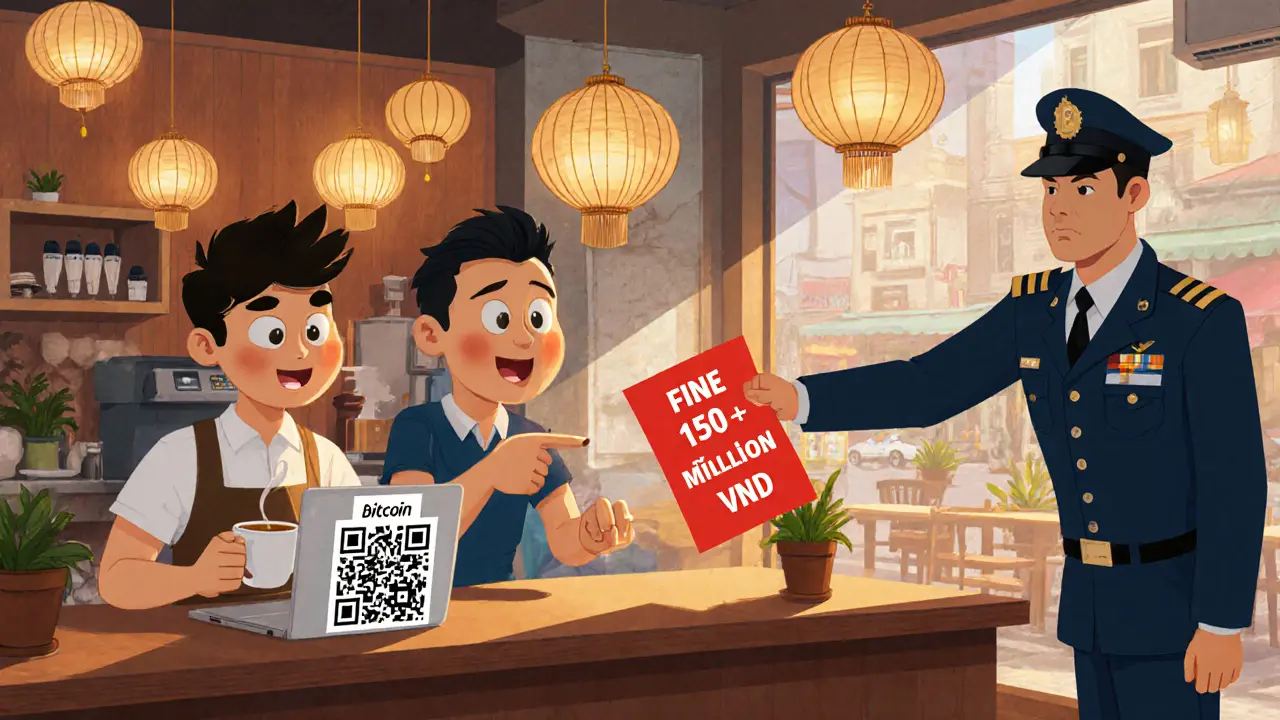Vietnam Crypto Payment Fine Converter
Convert Crypto Fine Amounts
Fine Information
Vietnam's State Bank of Vietnam (SBV) fines businesses 150-200 million VND for using cryptocurrency as payment.
This is equivalent to approximately $6,500-$8,900 USD based on current exchange rates.
Regional Comparison
| Country | Penalty for crypto payments | Current Rate |
|---|---|---|
| Vietnam | 150-200 million VND ($6,500-$8,900) | Strict prohibition |
| Thailand | Up to 2 million THB ($55,000) | Licensing required |
| Singapore | Up to S$10,000 | Strict AML/KYC regulations |
Imagine a coffee shop in Hanoi trying to accept Bitcoin for a latte, only to be hit with a 150‑200millionVND fine-about $6,500‑$8,900. That scenario isn’t a distant rumor; it’s a real consequence of Vietnam’s strict stance on using digital currencies as a payment method.
Key Takeaways
- The State Bank of Vietnam (SBV) bans all crypto‑based payments and levies fines of 150‑200millionVND per violation.
- Legal basis lies in Decree No.96/2014/ND‑CP, Decree 101/2012/ND‑CP (amended by Decree 80/2016/ND‑CP), and a 2018 SBV enforcement directive.
- Holding crypto is not illegal, but using it to pay for goods or services is.
- Enforcement has focused on high‑profile merchants; everyday peer‑to‑peer trades continue underground.
- Regional peers like Thailand and Singapore take a softer, licensing‑first approach, offering useful comparison points.
What the Law Actually Says
Decree No.96/2014/ND‑CP sets administrative sanctions for monetary and banking activities, including a 150‑200millionVND fine for issuing, supplying, or using Bitcoin as payment. The relevant clause reads: “The issuance, supply, and use of Bitcoin and other similar virtual currencies as a means of payment is prohibited.”
That prohibition is reinforced by Decree 101/2012/ND‑CP on non‑cash payments, amended by Decree 80/2016/ND‑CP. The amendment limits lawful payment instruments to checks, bank cards, and other SBV‑approved tools, leaving crypto out of the legal list.
The policy was sealed when Prime Minister Nguyen Xuan Phuc issued a directive in 2017 to develop a legal framework for virtual currencies. The SBV released its final framework on October 28, 2017, stating the ban would take effect on January 1, 2018.
Why Vietnam Chose a Hardline Approach
According to Le Truong Tung president of FTP University, the SBV worries that crypto payments could undermine monetary sovereignty, enable tax evasion, and make it harder for the central bank to control money flow. The concern isn’t about the technology itself but about losing a grip on the nation’s payment system.
In practice, the ban means that any business offering a crypto address for goods, services, or tuition can be fined. The fine amount-150‑200millionVND-matches the penalty for other illegal financial activities, signaling how seriously the regulator treats the breach.

How the Fine Is Enforced: Real‑World Cases
Before the 2018 deadline, a Vietnamese university announced plans to accept Bitcoin for tuition. The SBV quickly intervened, issuing a warning that the move would violate Decree No.96. The university scrapped the idea, avoiding the fine.
In November 2019, the SBV announced additional penal sanctions against merchants caught using crypto payments, though exact numbers weren’t disclosed. Most enforcement actions target visible, high‑profile attempts-restaurants, online stores, or educational institutions-rather than the countless peer‑to‑peer trades that happen on private messaging apps.
Community forums like Bitcoin Vietnam News show users still trading privately, carefully avoiding any transaction that could be traced to a formal merchant. That underground resilience suggests enforcement is technically possible but practically limited.
Comparison with Neighboring Countries
| Country | Legal status of crypto as payment | Typical fine / penalty | Enforcement approach |
|---|---|---|---|
| Vietnam | Prohibited | 150‑200millionVND (≈$6.5‑$8.9k) | Administrative fines; focus on high‑profile merchants |
| Thailand | Allowed with licensing | Fine up to 2millionTHB (≈$55k) for unlicensed activity | Licensing regime; regular audits |
| Singapore | Allowed under Payment Services Act | Variable; up to S$10,000 for non‑compliance | Regulatory sandbox; strict AML/KYC checks |
The contrast is clear. Thailand and Singapore see crypto as a potential financial service that can be supervised, while Vietnam treats it as an illegal payment channel that must be punished.
Practical Steps for Businesses in Vietnam
- Remove any crypto address from your website, point‑of‑sale, or invoices.
- Train staff to decline crypto‑based payments and to explain the legal reason politely.
- Implement a compliance checklist: verify that all payment methods are on the SBV‑approved list (checks, bank cards, e‑wallets).
- If you already hold crypto assets, keep them separate from payment operations-treat them as investment holdings, not as a transaction medium.
- Monitor SBV announcements for any policy shifts; the 2022 Monetary Policy Report reiterated the ban, but future drafts hint at possible tax‑related reforms.
Following these steps helps you stay clear of the 150‑200millionVND fine and shows regulators that you respect the current legal framework.

Future Outlook: Is the Ban Likely to Change?
In December 2021, a Draft Decree on Management of Virtual Assets kept the payment ban but proposed treating crypto as an asset class for tax purposes. The 2022 Ministry of Finance Draft Circular on Tax Management for Virtual Asset Transactions suggested a shift toward recognizing crypto profits for tax reporting.
Experts like Dr. Tran Ngoc Ca former Deputy Director of Vietnam's Academy of Finance argue that while the fine remains enforceable on paper, the rapid growth of crypto usage makes widespread enforcement impractical. This pressure could lead to a more nuanced regime-perhaps a licensing model similar to Thailand’s-or at least clearer tax guidelines.
Until any formal amendment is published, the safe bet is to avoid using crypto for payments altogether.
Quick Reference Cheat‑Sheet
| What is prohibited? | Using Bitcoin, Ethereum, or any similar virtual currency as a means of payment. |
|---|---|
| Legal fine range | 150‑200millionVND (≈$6,500‑$8,900). |
| Key legal documents | Decree No.96/2014/ND‑CP, Decree 101/2012/ND‑CP (amended by Decree 80/2016/ND‑CP). |
| Enforcement body | State Bank of Vietnam (SBV). |
| Is holding crypto illegal? | No, only using it for payments is prohibited. |
Frequently Asked Questions
What exactly does the 150‑200millionVND fine cover?
The fine applies to any individual or business that issues, supplies, or accepts Bitcoin or other virtual currencies as a payment method. It also covers promoting such payments.
Can I still own Bitcoin in Vietnam?
Yes. Holding, buying, or selling crypto on exchanges is legal, as long as the transaction isn’t used to pay for goods or services.
How does the fine compare to penalties in other Southeast Asian countries?
Vietnam’s fine is modest compared with Thailand’s possible 2millionTHB (≈$55k) for unlicensed activity and Singapore’s variable penalties up to S$10,000. However, Vietnam’s strict prohibition makes any payment attempt a direct violation.
What should a small business do to avoid the fine?
Remove crypto payment options, train staff, keep crypto holdings separate from sales, and regularly check SBV updates for any policy changes.
Is there any indication the ban will be lifted soon?
Recent drafts suggest the government may treat crypto as a taxable asset, but the payment ban remains in force. A full repeal looks unlikely in the near term.



Scott Hall
October 13, 2025 AT 01:18Wow, those 150‑200 million VND fines are a real eye‑opener. It’s like the government is saying, ‘Don’t even think about crypto payments unless you want to pay a small fortune.’ Compared to Thailand’s 2 million THB cap, Vietnam’s approach feels stricter, but at least the penalty range is clear. For a small shop, $7k‑$9k could shut them down, so the risk is huge. Still, it sends a strong signal that the State Bank isn’t messing around.
Laura Myers
October 13, 2025 AT 15:11So, Vietnam’s decree basically slaps a 150‑200 million VND ticket on anyone daring to accept crypto. That’s about $6.5‑$8.9 k-enough to make a startup think twice! The law is crystal clear: no crypto payments, period. It’s wild how some neighboring countries allow licensed crypto activity, yet here it’s a straight prohibition.
Ted Lucas
October 14, 2025 AT 05:04🚀 The regulatory environment is a classic case of regulatory risk meets compliance cost. With a fine ceiling of 200 M VND, any payment gateway that integrates crypto basically faces a financial exposure that dwarfs average transaction volumes. In capital‑intensive sectors, that’s a red flag for risk‑adjusted ROI models. Plus, the enforcement mechanism under Decree 96/2014/ND‑CP is pretty aggressive-so compliance teams need to flag crypto acceptance immediately. 🛑
ചഞ്ചൽ അനസൂയ
October 14, 2025 AT 18:58It’s fascinating how a single policy can reshape an entire ecosystem. The Vietnamese stance feels like a moral lesson: technology should serve the public good, not bypass traditional finance. While the fine is steep, it also points to deeper concerns about money laundering and market stability. Perhaps this will spark a broader conversation about how developing economies can balance innovation with oversight.
Helen Fitzgerald
October 15, 2025 AT 08:51Hey folks, imagine trying to run a boutique coffee shop and suddenly getting hit with a $8,000 fine just for letting a customer pay in Bitcoin. That’s a nightmare! It’s great the post broke down the numbers for us-makes the abstract fine feel real. I hope more businesses share their experiences so we can all learn how to navigate these crazy rules.
Jon Asher
October 15, 2025 AT 22:44Totally agree, the fine can cripple small merchants. Even a single slip could wipe out months of profit.
Leynda Jeane Erwin
October 16, 2025 AT 12:38On the one hand, the fine is clearly defined, yet on the other hand, the enforcement seems draconian - a contradictory blend of formality and casualness that leaves many confused.
Nina Hall
October 17, 2025 AT 02:31Love the breakdown, especially the risk‑adjusted ROI part! It really helps visualize why many startups would shy away from crypto in Vietnam.
arnab nath
October 17, 2025 AT 16:24It’s obvious the government wants to control capital flow; they’re probably hiding something bigger behind the scenes.
Philip Smart
October 18, 2025 AT 06:18Yeah, that $8k fine is no joke. Makes me wonder if the rule is just a way to keep us away from crypto entirely.
Jacob Moore
October 18, 2025 AT 20:11Exactly, the financial exposure can be a death sentence for a fledgling business. One practical tip is to set up a strict internal policy prohibiting any crypto transaction and to train staff regularly on compliance. This way you reduce the risk of accidental acceptance and keep your cash flow safe.
Lady Celeste
October 19, 2025 AT 10:04The policy is overblown; a fine that big just scares everyone off and kills innovation.
Ethan Chambers
October 19, 2025 AT 23:58While the risk‑adjusted calculations are sound, one could argue that such heavy penalties stifle the very competition that drives financial tech forward. It’s a classic case of regulatory overreach.
gayle Smith
October 20, 2025 AT 13:51From a compliance standpoint, the decree is a clear red line-any crypto acceptance is a violation, and the penalty is massive. Companies must embed this rule into their SOPs or risk substantial fines.
mark noopa
October 21, 2025 AT 03:44🤔 Let’s unpack why Vietnam’s hefty crypto fine is more than just a number on paper. First, the fine of 150‑200 million VND translates into a real economic burden that can cripple even medium‑sized enterprises, especially those operating on thin margins. Second, the regulatory language in Decree 96/2014/ND‑CP is intentionally vague, leaving room for discretionary enforcement that can vary from one province to another. Third, this ambiguity fuels a climate of uncertainty, causing businesses to allocate resources to legal counsel instead of growth initiatives. Fourth, the comparative analysis shows Thailand allowing crypto with a licensing model, while Singapore imposes modest AML/KYC requirements-Vietnam’s outright prohibition stands out starkly. Fifth, such a prohibition could drive crypto activity underground, making it harder for authorities to monitor illicit flows. Sixth, the fine acts as a deterrent, but it also discourages legitimate innovation in blockchain payments that could benefit the economy. Seventh, the lack of a clear pathway for compliance means firms can’t simply “register” to avoid penalties. Eighth, this could push startups to relocate to more crypto‑friendly jurisdictions, resulting in a brain‑drain. Ninth, the penalty’s size relative to average wages amplifies its social impact, potentially sparking public backlash. Tenth, the government might view this as a protective measure for the national currency, yet the long‑term opportunity cost of missing out on fintech advancements is substantial. Eleventh, investors watching Vietnam’s market may see the fine as a red flag, affecting foreign direct investment inflows. Twelfth, the legal risk also affects banks, which may tighten relationships with merchants out of caution. Thirteenth, the enforcement mechanism-potentially swift and severe-adds a layer of operational risk that many businesses cannot absorb. Fourteenth, from a strategic standpoint, the fine signals a broader policy direction that may encompass other emerging technologies. Lastly, while the intention may be to safeguard the financial system, the collateral damage could outweigh the perceived benefits, making this a policy worth revisiting. 🚀
Rama Julianto
October 21, 2025 AT 17:38Listen, if you want to avoid the fine, lock down your POS system now. No crypto, no exceptions. Train every employee, audit daily, and you’ll be safe.
Jade Hibbert
October 22, 2025 AT 07:31Oh sure, because the fine is just a friendly reminder to stay away from innovation. Got it.
Brandon Salemi
October 22, 2025 AT 21:24Regulators love to kill the buzz; they’re the ultimate buzzkill.
Siddharth Murugesan
October 23, 2025 AT 11:18That fine will just push crypto underground.
Hanna Regehr
October 24, 2025 AT 01:11While the analysis is thorough, I’d add that a balanced approach-perhaps a licensing regime instead of outright bans-could achieve regulatory goals without stifling growth. It’s a nuanced issue that deserves more dialogue.